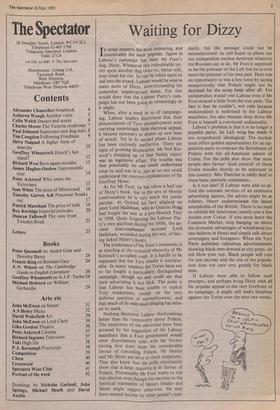Waiting for Dizzy
T n some respects the most endearing, and .1.conceivably the most popular, figure in Labour's campaign has been Mr Foot's
dog, Dizzy. Whenever this redoubtable ter- rier spots another dog twice or, better still,
four times his size, he can be relied upon to
sail into the attack. Labour would be wise to make more of Dizzy, notwithstanding his
somewhat inappropriate name. For few would deny that the Labour Party's cam- paign has not been going as swimmingly as it might.
When, after a week or so of campaign- ing, Labour leaders discovered that their
denunciations of Tory unemployment were
carrying surprisingly little electoral appeal, it became necessary to dream up new lines of attack. Yet in its second phase Labour has been curiously ineffective. There are signs of growing desperation. Mr Neil Kin- nock's dredging up of that Neddy report
was an ingenious affair. The trouble was that practically no one could understand what he said was in it, just as no one could understand the contrary explanations of Sir Geoffrey Howe.
As for Mr Foot, he has taken a leaf out of Dizzy's book, but in the arts of bloody confrontation he is very much the junior partner. At Oxford his fury alighted on poor Lord Hailsham, who as Quintin Hogg had fought the seat as a pro-Munich Tory in 1938. Quite forgetting the Labour Par- ty's own pacifism during the 1930s, the an- cient non-combatant accused Lord Hailsham, wounded during the war, of hav- ing licked Hitler's boots.
The irrelevance of Mr Foot's comments is as startling as the technical obscurity of Mr
Kinnock's so-called coup. It is hardly to be supposed that the Tory citadel is unstorm- able. In many respects the Tories have not so far fought a particularly distinguished campaign, though no one could say that their advertising is not slick. The point is that Labour has been unable to exploit Tory weaknesses, except on the very dubious question of unemployment, and that much of its wild mud-slinging has miss- ed its mark.
Nothing illustrates Labour shortcomings better than the controversy about Polaris. The suspicions of the electorate have been aroused by the suggestion of the Labour manifesto that a Foot government would enter disarmament talks with the Soviets having first done them the considerable favour of conceding Polaris. Mr Healey and Mr Shore are alive to these suspicions. They also know that the polls consistently show that a large majority is in favour of Polaris. Presumably Mr Foot wants to win this election even though his reaction to the heretical statements of Messrs Healey and Shore might suggest otherwise. He may have seemed unclear by other people's stan-
dards, but the message could not be misunderstood: he still hopes to phase out our independent nuclear deterrent whatever the Russians say or do. Mr Foot is supposed to be the prisoner of the Left but he is even more the prisoner of his own past. Here was an opportunity to win a few votes by saying unequivocally that Polaris might not be .destined for the scrap heap after all. For unilateralists would vote Labour even if Mr Foot strayed a little from the true path. The fact is that he couldn't, not only because unilateralism is enshrined in the Labour manifesto, but also because deep down Mr Foot is himself a convinced unilateralist.
Labour's problem is that it is no longer a populist party. Its Left wing has made it too scrupulously ideological. The nuclear issue offers golden opportunities for an op- position party to contrast the Britishness of Polaris with the all-American nature of Cruise. For the polls also show that most people also favour 'dual control' of those Cruise missiles shortly to be stationed in this country. Mrs Thatcher is oddly deaf to these basic patriotic sentiments.
Is it too late? If Labour were able to af- ford the constant services of an expensive advertising agency, the advice might be as follows. Never underestimate the latent xenophobia of the British. There is no need to rubbish the Americans; merely sow a few doubts over Cruise. If you must leave the Common Market, stop banging on about the economic advantages of withdrawal (no one believes in those) and simply talk about sovereignty and foreigners. When the Tory Party publishes ridiculous advertisements showing black men dressed as city gents, do not blow your top. Black people will vote for you anyway and the rest of the popula- tion does not care very greatly for black men.
If Labour were able to follow such precepts, and perhaps bring Dizzy with all his popular appeal to the very forefront of its campaign, it might still make headway against the Tories over the next two weeks.














































 Previous page
Previous page